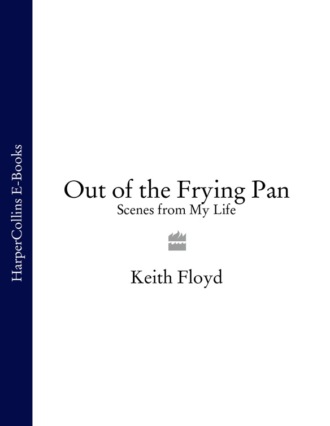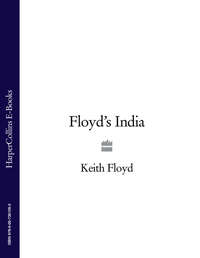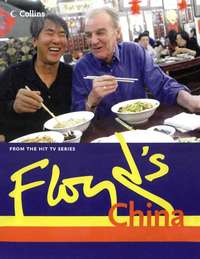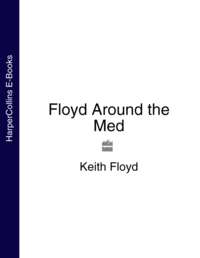
Полная версия
Out of the Frying Pan: Scenes from My Life
It was about now that I became aware that my new life at Wellington School was hugely different from my life at home, and I am ashamed to say, I went through a phase of being embarrassed by my parents’ modest means and lifestyle. Now well and truly into long trousers, other boys were sporting worsted blazers and finely woven flannels while I was having to make do with the standard serge blazer and thick grey trousers. Also I was growing dissatisfied, not to say resentful, that I never quite managed any of the school trips abroad. This growing resentment came to a head in my last term at school (I was to leave at sixteen, to my great disappointment – I wasn’t considered bright enough to justify the continuation of increasing school fees) when, without consulting my father, I ordered a fine double-breasted blazer, a fine pair of flannels and some Oxford-toed shoes from the school shop.
I think my parents were a little disheartened when they read my final school report and analysed my four meagre O levels, but they were both furious and frightened when they opened the final school bill. My sartorial shopping expedition put the family finances under extreme pressure. I had, it turned out, as my ashen-faced father told me, spent more money on clothes in one hour than he earned in over a month. Not a happy start for an unemployed school leaver about to foray into grown-up life.
Nearly forty years later I still have the same problem with tailors, shoemakers and shirt shops! I can’t resist shopping.
During my last couple of terms at Wellington my father was made redundant in Taunton and was offered relocation to either Newton Abbot in Devon or Bristol. Although I think they would have preferred to stay in Somerset they elected to go to Bristol, where they thought both Brenda and I would have much better career prospects. Thanks to my father’s industriousness and careful management he was able to obtain a mortgage to buy a council house in Sea Mills from the Bristol Corporation. It was a great leap forward for my parents to own their own house. I, unfortunately, was devastated, for the most appallingly wrong reasons of social status. Despite their best efforts to be fair and tolerant my relationship with my parents deteriorated for the next three or four years and were amongst the worst in my life.
I was angry and frustrated because the aspirations instilled in me at Wellington were at loggerheads with post-school reality. I needed a job quickly as I had to repay the money for the dreaded blazer. My parents, ever cautious, tried to persuade me to take a clerk’s job with the Bristol Corporation or the Electricity Board or the GPO, the sort of dull, meaningless job from which you could never be sacked, and end up with a silver watch and a modest pension. I spent two desperately unhappy months filing plans in the Bristol Corporation’s Department of Architecture for the princely sum of £4 7s 8d per week.
At the same time, at just sixteen, I discovered the alluring demimonde of a Clifton coffee bar – at that time in Bristol there were one or two very basic Indian restaurants, one or two appallingly basic Chinese restaurants, the aforementioned coffee bars and omelette bars. For the grown up and affluent there were restaurants just emerging such as the steak bars, started by the Berni Brothers. Bistros, brasseries, wine bars and so forth were still nonexistent, and as for pubs, which I as a spotty, skinny youth of sixteen was unable to enter, they served no food beyond crisps, pickled eggs and a pork pie. So my evenings were spent sipping a cold glass cup of frothy coffee whilst listening to the jazz and blues played on a record player, marvelling at the sophisticated university students and what I took to be painters, writers and artists discussing continental films that were shown at the Tatler Cinema, as they puffed on Gauloises and Gitanes. I was so young and they seemed so old. I could not see a way to cross the bridge that seemed to span the wide gap between me and them.
I had somehow acquired a Vespa motor scooter and for some odd reason I had been persuaded to join a youth club favoured by the middle-class kids from the houses on the private estates that ringed my council estate. These kids all had driving licences and borrowed their fathers’ cars on Saturday nights. I was a fish out of water both socially and intellectually (I regarded myself as intellectually superior and socially inferior) so I left.
Looking back on my life, I think I have been really quite a loner, and although the tabloid press has almost convinced even me that I am some kind of hell-raising party animal, or the hail-fellow-well-met in the bar, I have a fear of crowds and even now, at the age of well over fifty, am sometimes too shy to walk alone into a public place.
There was an awful time when I was fourteen or so, back in Wiveliscombe, and I was invited to a fancy dress party to celebrate some boy’s birthday. I was mortified when I discovered that I was the only one in fancy dress. I left the party in tears of embarrassment, roundly ridiculed by the others, and have had difficulty attending parties ever since. And the youth club experience had a profound effect on me too, with the result that I have a completely prejudiced and irrational scorn for golf clubs, darts teams, yacht clubs, Rotary clubs or committees; and even though I thoroughly enjoyed occasionally playing club rugby in Bristol – and we would always rush down after our game to the memorial ground to catch the last fifteen minutes of another Bristol victory – and, sure the few pints in the clubhouse were great, once the singing started I lived in fear of being called upon to perform. Worse still was the appalling way we behaved in the Indian restaurant later. The lads would go to the lavatory and escape through the window without paying, leaving the more timid of us protesting our innocence and insisting on paying only our own share.
After a while I washed up a couple of evenings a week in the coffee bar for ten bob a night and later I spent another two nights serving coffee and cleaning tables. In a few months I was hanging out with the students and the gap between my aspirations and my home life was further exaggerated. I wasn’t old enough to have the house key and after several nights of my parents waiting up for me, they had, as my father said, ‘to draw a line’. If I wasn’t home before they locked the door, I would have to sleep in the garden shed.
My sister was also living at home. I think she had a job demonstrating cooking appliances in an Electricity Board showroom. I seldom saw her. She, as in Wiveliscombe, had joined tennis clubs and other worthy associations and to my mind was appallingly middle class. Our paths very, very seldom crossed. Handsome young men with MGs or souped-up Minis vied to take her to dances and balls. I think she thoroughly enjoyed this time, I was desperate to leave home.
Sometimes I was ashamed at the anxiety I was causing my parents and my father, who was such a fair and balanced man, doing everything in his power to discuss my adolescent problems, but I found I was unable to communicate with him. Later, when we became the closest of friends, he explained the hurt I had caused them and reminded me that while perhaps I didn’t know what I was doing, neither did he. ‘When you were sixteen,’ he said, ‘it was the first time I had been father to a sixteen-year-old boy, and I had no experience to draw on.’
Although my Bristol life in the coffee bars and folk clubs was good and the conversation was of Jack Kerouac and Woody Guthrie, I strangely still had a hankering for my boyhood time in Wiveliscombe, playing French cricket in the back yard with my handicapped Aunt Eva, or sitting with my grandfather, turning over the pages of a book called The Great War in Pictures while he, to the fury of my grandmother, flicked the ash from his chainsmoked cigarettes straight onto the lino, or eating boiled pigs’ trotters with salt and vinegar in front of the fire on winter Saturday nights.
Sometimes my grandfather, a rather clumsy man, would take a sudden interest in cooking and he spent days bubbling vast cauldrons of tomato sauce. At other times he would gather snails from the privet hedge in the dank back garden and roast them on a shovel in the fire. I suppose he must have known how to clean them because we never suffered from any ill effects.
I missed fishing, and I missed my Auntie Joyce, who once saved me from bleeding to death when I, running and sliding down the highly polished passage that led from our kitchen to the front door, put my arm through the window in the door, gashing my upper arm wide open. She heard my cries of panic, picked me up, and in bare feet ran down the street and frantically hammered on the doctor’s door. She, like my Uncle Ken, was young compared to my mother and my other uncles and so on Sunday afternoon walks she would sing folk songs, with a slightly risque rearrangement of the words.
Some years later she was found dead in a snowdrift on a hill where once she had taken me tobogganing. It was her only exit from a private hell that, until too late, no one had been aware of.
Then there was my one and only thespian performance, when somehow, after the nightmare of the fancy dress party, I agreed to be Mowgli in the Scout and Cub group’s annual jamboree in the Town Hall. My mother sewed me a loincloth of rabbit skin and my father improvised me a dagger from one of my grandfather’s leather-cutting knives. Painted from head to toe in cocoa and water I stood on the stage and said, defiantly, ‘I am Mowgli.’ To this day I cannot remember if I completed the performance or ran backstage.
I missed my friends the Ranseys, not least Mrs Ransey, who, like my own mother, was one of nature’s intuitive cooks with a real, fundamental knowledge, love and respect for food.
Sometimes, on my Vespa 125, I whizzed down the A3 8 like a mad wasp, flat out at 45 miles an hour, to Wiveliscombe for the day, but it wasn’t the same. Then I thought it had changed; now I know that I had. I was staying out later and later listening to blues, folk songs, monologues and poetry readings. The rows at home, no longer squalls, were now developing storm status and one day, with just a small duffel bag, I set off for work as normal, and instead of taking the bus to College Green, my place of employment, I caught another to the A4 and hitchhiked to London. I survived, somehow, in late-night coffee bars, railway stations and parks for three days and three awful nights before I was arrested for loitering, or possibly vagrancy, at four o’clock one morning somewhere close to Bow Street Police Station. I was tired, hungry and, worse still, I had failed. Contact was made with my parents, who assured me my safe return was more important than anything and there would be no retribution. As bad as this was, it proved to be a watershed in our relationship.
I had decided I wanted to be a newspaper reporter and my parents, in a complete reversal of their crushingly modest ambitions for me, agreed I could have a go at it. I had no idea how you set about being a journalist but I had read a book called Headlines All My Life by a Fleet Street editor called Arthur Christiansen. He was, as Editor of the Daily Express, probably one of the greatest editors of this century. (He had also had a bit part in the film The Day the Earth Caught Fire.) I did not know that the accepted route into journalism was by joining a weekly newspaper as a copy boy. I, with a head full of Evelyn Waugh, Hemingway, James Thurber, Simon Raven, Somerset Maugham, Scott Fitzgerald, Robert Graves and Jack Kerouac, boldly wrote to the Editor of the Bristol Evening Post and asked for a job. Despite my parents’ new attitude, they warned me not to be disappointed after aiming so high. I knew from films and novels that reporters wore bow ties, trench coats and trilby hats, so scraping together all my available resources, selling my fishing tackle and even my Chuck Berry and Elvis Presley LPs, I went to the nearest gentlemen’s outfitters and bought the aforementioned clothes for my interview with the Editor of the Bristol Evening Post.
Can you imagine it? A seventeen-year-old with a shiny, acned face, dressed in such a way. I sat in the outer office while the secretary announced my presence. She returned after a few seconds and said, ‘When the green light flashes, knock and go in.’ A big, round-faced, smiling man with short cropped hair sat behind the desk, his fingers propped together forming a pyramid between his elbows and his chin. On his neat desk there was a Penguin edition of The Trial of Lady Chatterley. He wore a dark, well-cut suit, a white shirt and a bow tie. A bow tie! So they did wear bow ties. I was wearing a bow tie. He looked at me askance, not patronisingly, but he seemed to stare right through me. ‘Do sit down,’ he said. He rearranged his fingers to clutch the lapels of his jacket and leant back in his chair. ‘Well?’ he said. ‘I’ve brought you some essays I wrote at school,’ I said. ‘We don’t write essays on newspapers,’ he said, reaching to take them from my trembling hand. I told him about my school days. I told him of my dissatisfaction of being a filing clerk in the Architects’ Department. I told him about the books I had read and lied, successfully, about one or two I hadn’t. All of a sudden, the interview, or perhaps the confessional, was over.
He ushered me into the outer office and I realised for the first time how tall he was. There was no conclusion, and I stood, awkwardly, wondering how to leave. I suddenly decided to say, ‘Well, will you give me a job or not?’ He looked down at me, and his breath smelt strange. Later I was to know it was garlic. ‘Yes,’ he said, ‘as a matter of fact I will. My secretary will take the necessary details and you will report to the News Editor a week on Monday at 8.30 a.m. His name is Farnsworth: he will probably eat you alive, but don’t worry.’ Before I could utter a word he disappeared into his office. It was going to turn out to be the single most important day of my life. Not that I would know that for another twenty-four years.
Конец ознакомительного фрагмента.
Текст предоставлен ООО «ЛитРес».
Прочитайте эту книгу целиком, купив полную легальную версию на ЛитРес.
Безопасно оплатить книгу можно банковской картой Visa, MasterCard, Maestro, со счета мобильного телефона, с платежного терминала, в салоне МТС или Связной, через PayPal, WebMoney, Яндекс.Деньги, QIWI Кошелек, бонусными картами или другим удобным Вам способом.






